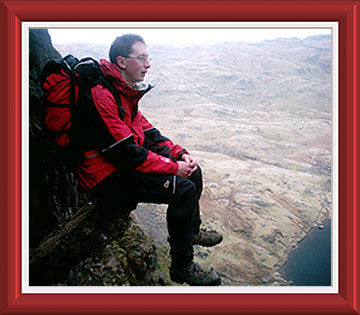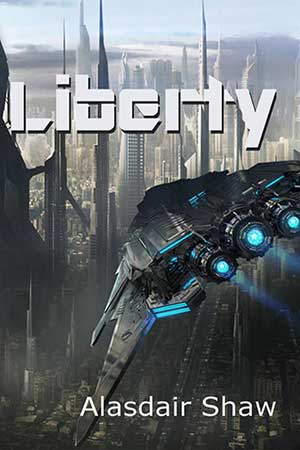Joining me today is author Alasdair Shaw, who would be just as comfortable talking to Stephen Hawking or Sheldon Cooper about Theoretical Physics as he is about talking to me as an author. Thank you, Alasdair, for taking the time to chat to me. Please sit down, get comfortable and let’s begin.
About Alasdair Shaw
Alasdair Shaw grew up in Lancashire, within easy reach of the Yorkshire Dales, Pennines, Lake District and Snowdonia. After stints living in Cambridge, North Wales, and the Cotswolds, he has lived in Somerset since 2002.
He has been rock climbing, mountaineering, caving, kayaking and skiing as long as he can remember. Growing up he spent most of his spare time in the hills. Recently he has been doing more sea kayaking and swimming.
Alasdair studied at the University of Cambridge, leaving in 2000 with an MA in Natural Sciences and an MSci in Experimental and Theoretical Physics. He went on to earn a PGCE, specialising in Science and Physics, from the University of Bangor. A secondary teacher for over fifteen years, he has plenty of experience communicating scientific ideas.

What’s the name of the book you’d like to talk about?
Liberty

Tell us a bit about your book
Struggling with newfound sentience and desperately trying to repair itself, The Indescribable Joy of Destruction is a ship trying to find a new home. In a galaxy torn apart by generations of civil war, that isn’t an easy task. Tired of being used as a killing machine, it has a huge decision to make: hide and save itself, or help other artificial intelligences achieve freedom. Unable to make the decision alone, it revives the sole human aboard – the enemy officer who crippled it.
Commander Olivia Johnson wakes to find herself in the infirmary of a strange vessel. Her nightmares deepen when she discovers it is the ship that attacked her destroyer. Even as she recovers from her physical injuries, she can’t get past her survivor’s guilt. She might have failed to protect her crew, but she vows to take revenge on their killer.
When the ship uncovers a genocidal plot by the commander’s own admirals, Johnson realises just what is at stake. Together, the AI ship and the human officer must recruit outsiders from both sides. Training the misfits in battle to prevent the atrocity may be an impossible task, but running and hiding is no longer an option.
If there was a film or TV adaptation of your book, who would you like to see play your characters?
Indie is easy. From the moment he dressed himself up in a Napoleonic captain’s uniform, I saw Aidan Turner (of Being Human, Poldark, and The Hobbit fame) playing him.
Do you read reviews of your book(s)? Do you respond to them, good or bad? How do you deal with the bad?
I do read them, but don’t respond. The good ones make me feel like it’s all worth it. To be honest, I haven’t had many bad ones yet. When I do get one, I see if there is something to it; one caught a typo that was really significant – 1919 instead of 1909. If there is something I can improve in the next book, I will. If it is just a one-off opinion, I’ll move on and not dwell on it.
How long does it usually take you to write the first draft of a book?
It took me a year and a half to write the first draft of Liberty. I have a full-time job, a young family, and I edit as I go along, so I rarely manage more than 1200 words in a day. I also put aside days to go back and read/edit previous chapters to keep them fresh in my mind. When I am happy with a chapter, I put it on Scribophile for critique. Making changes based on the feedback from that also takes time away from writing new stuff.
However, I don’t regret the way I do it. Whilst the first draft took eighteen months, it only took a couple of months to do the two major redrafts.
What are you working on now?
I’m currently working on Equality, the next book in the Two Democracies: Revolution series. Johnson has to lead Legion Libertus to retake their ‘home’ moon, Robespierre, and strengthen their ties with Concorde. Meanwhile, she continues the political wrangling in an attempt to have Robespierre recognised as an equal partner in the alliance, whilst Indie campaigns for equal rights for AIs.
Describe what your ideal writing space looks like.
My ideal place to write is outdoors. In summer, I spend as much writing time as possible on my laptop in the garden. I have been known to set up on a beach or up a mountain with my Surface.
If I can’t work outside, because of rain, or too much sun reflecting off the screen, I prefer to sit somewhere with a good view. My study looks out the front, along a flower bed. When I can, I sit in the conservatory, surrounded by my flower beds.
Why should a potential reader buy your book(s)?
I’ll leave that up to one of my reviewers:
“this novel takes the reader down unusual paths with well thought out twists and turns that took me places I never saw coming. If you like your space opera simple-good guys wipe the bad guys, kiss their horse and go home you may be in the wrong place. If you want well crafted story telling that sticks with you, you may be in luck. Some of the best written, original scifi I have come across in a long time.”
What’s an interesting fact about your book?
Only two copies of the original version were printed. It turned out to be the wrong size, so if I ever become famous, they could become collectors’ pieces. One was the proof copy I ordered, which I will sign and donate to a charity at some point. I have no idea who bought the other.
Why did you choose to write in your genre? If you write in more than one, how do you balance them?
I write science fiction, popular science, physics textbooks, and walking guides. I chose those genres because they were things I enjoyed, either reading about or doing. I balance them by writing what I feel like at any particular moment. It is a great way to avoid writers’ block – if I can’t see where to go next on something, I don’t waste time sitting staring at the screen, I change genre and get on with something else.
Do you have a day job in addition to being a writer? If so, what do you do during the day?
My main job is a secondary school teacher. I teach physics and computer science to 10-18 year olds. I am also an outdoor activities instructor, specialising in caving, rock climbing, and mountaineering. As a lead examiner for physics A-levels, June is probably my most hectic month.
Who are your favourite authors, and why?
My favourite authors include Isaac Asimov, Iain M Banks, Simon Scarrow, C S Forrester, Julian Stockwin, Bernard Cornwell, Jasper Fforde, and Terry Pratchett. They write dashing plots with interesting characters and a measure of wicked humour.
Where can readers go to discover more about you and your books?
Website | Blog | Facebook | Twitter | Amazon Author Page | Goodreads
Available formats: ebook and paperback
1



Be the first to comment!